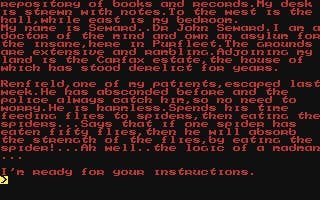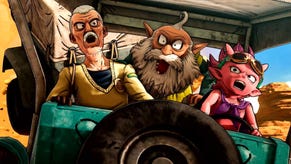Bram Stoker's Dracula
Bloody Hell.
Bah humbug Zzap 64 and your miserly 59 per cent. Never was I in such apoplectic disagreement with one its reviews. This ground breaking horror title was, to my mind, the most atmospheric, and genuinely disturbing old school text adventure of the 1980s. 59 per cent? GET OUT!
If, like me, you slavishly played every sodding piece of interactive fiction there ever was (Ship of Doom? Yep. Inca Curse? Ding. Waxworks? Tick. The Hulk? Uh-huh. Dennis Through the Drinking Glass? Oui. Terrormolinos? Nod. Etc.) throughout most of the 1980s, you remember the really good examples, and this was an absolute corker for those of us schooled in Bram Stoker, Mary Shelly, Stephen King and James Herbert..
Released in the darkest depths of 1986, Dracula was notable primarily for being the first game to ever get a BBFC rating. Not even 14 at the time, I had to put on my deepest pubescent voice to convince the man in Norwich's One Step Beyond that, yes, I was 15. No, I wasn't going to have nightmares and come and sue them for psychological issues later in life. Yet.
Designed using The Quill, Rod Pike managed to eke out plenty of dramatic potential out of the package, but much of the time with the game was spent trying to second guess what phrase the parser wanted from you. Somehow that was part of the fun back then, but that possibly has a lot to do with the free time we all had at that stage in our lives. And living in Norwich.
Divided into three standalone stories inspired by the events in the renowned horror classic, the real draw of the game was Pike's knack for intense, involving and above all atmospheric narrative, and the sense of danger he managed to infuse into practically every location and scenario.

As much as I totally bought into the point and click adventure revolution that followed shortly afterwards, I'll always remember that games like Dracula immersed you in a way that games have struggled to ever since - and the many gory death sequences, with their accompanying digitised pictures are still with me over two decades on. Mummy!
Like a good book versus a good film, both have a lot to offer, but text adventures were really onto something that's now lost to the world in any commercial sense. Level 9, Infocom, Magnetic Scrolls - interactive fiction gods of their time.









